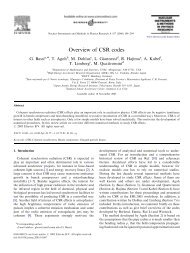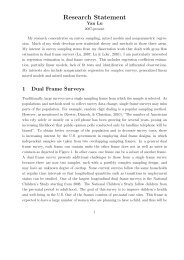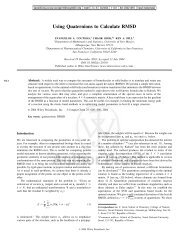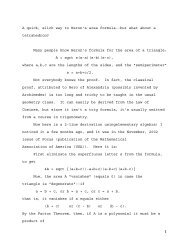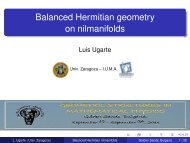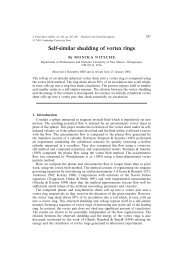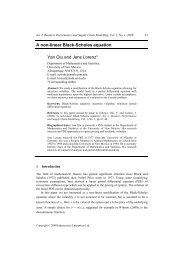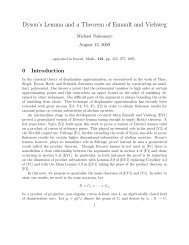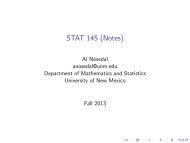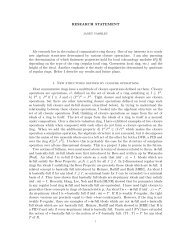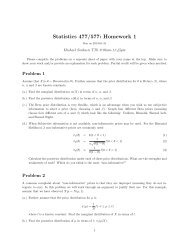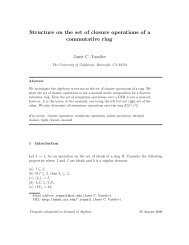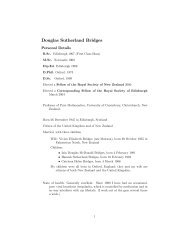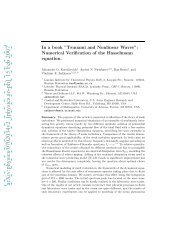OEO Office of Equal Opportunity - Department of Mathematics and ...
OEO Office of Equal Opportunity - Department of Mathematics and ...
OEO Office of Equal Opportunity - Department of Mathematics and ...
You also want an ePaper? Increase the reach of your titles
YUMPU automatically turns print PDFs into web optimized ePapers that Google loves.
244 ARTS AND SCIENCES<br />
Theodore Guinn, Ph.D., University <strong>of</strong> California<br />
(Los Angeles)<br />
Liang-Shin Hahn, Ph.D., Stanford University<br />
Reuben Hersh, Ph.D., New York University<br />
Lambert H. Koopmans, Ph.D., University <strong>of</strong> California<br />
(Berkeley)<br />
James V. Lewis, Ph.D., University <strong>of</strong> California (Berkeley)<br />
Richard C. Metzler, Ph.D., Wayne State University<br />
Cornelis W. Onneweer, Ph.D., Wayne State University<br />
Pramod K. Pathak, Ph.D., Indian Statistical Institute<br />
Clifford R. Qualls, Ph.D., University <strong>of</strong> California (Riverside)<br />
Arthur Steger, Ph.D., University <strong>of</strong> California (Berkeley)<br />
William J. Zimmer, Ph.D., Purdue University—Statistics<br />
Introduction<br />
<strong>Mathematics</strong> is fundamental to the formulation <strong>and</strong> analysis<br />
<strong>of</strong> scientific theories, is a rich <strong>and</strong> independent field <strong>of</strong> inquiry,<br />
<strong>and</strong> its study is excellent preparation for life in our highly specialized<br />
society. Active research throughout the mathematical<br />
subdisciplines, spurred on in part by advances in computing<br />
technology, leads to new perspectives <strong>and</strong> applications. The<br />
major in mathematics combines broad study <strong>of</strong> fundamental<br />
theories with in-depth investigation <strong>of</strong> particular subjects<br />
chosen from pure, applied <strong>and</strong> computational mathematics.<br />
A degree in mathematics, either alone or in combination with<br />
study in another field, is excellent preparation for careers in<br />
industry, universities <strong>and</strong> research institutes. The major in<br />
mathematics with the mathematics education option satisfies<br />
all the requirements for a license to teach mathematics at the<br />
secondary level in New Mexico.<br />
Statistics is the science <strong>of</strong> collecting <strong>and</strong> analyzing data.<br />
Statisticians interact with researchers in all the various disciplines<br />
<strong>of</strong> science, engineering, medicine, social science <strong>and</strong><br />
business to develop scientifically sound methods in those<br />
areas. Most course work in the department is devoted to<br />
underst<strong>and</strong>ing current methods <strong>and</strong> the reasoning behind<br />
them. A degree in statistics prepares students for careers in<br />
industry, government, universities <strong>and</strong> research institutes, as<br />
well as being excellent preparation for pr<strong>of</strong>essional programs<br />
in medicine, law, business administration <strong>and</strong> public policy<br />
<strong>and</strong> administration.<br />
High School Students. In order to graduate from the<br />
University <strong>of</strong> New Mexico, all students are required to take<br />
a minimum <strong>of</strong> 3 credits <strong>of</strong> mathematics course work at the<br />
college algebra (MATH 121) level or above. To prepare for<br />
this level <strong>of</strong> study, high school students must take two years<br />
<strong>of</strong> algebra <strong>and</strong> one year <strong>of</strong> geometry prior to admission.<br />
Students should take mathematics during their senior year<br />
<strong>of</strong> high school, <strong>and</strong> also take the SAT or ACT examination<br />
during that year, for the best preparation <strong>and</strong> placement<br />
into mathematics courses at the University <strong>of</strong> New Mexico.<br />
Students planning to major in any scientific or technological<br />
field should take more advanced mathematics courses in<br />
high school. Placement in <strong>Mathematics</strong> or Statistics courses<br />
at UNM is based on the most recent ACT/SAT Math scores.<br />
A beginning student who wishes to take MATH 163 or a more<br />
advanced course must have departmental approval.<br />
A student who wishes to enroll in a course requiring a prerequisite<br />
must earn a grade <strong>of</strong> C (not C-) or better in the<br />
prerequisite course.<br />
Flow Chart for Beginning Courses<br />
A student’s preparation determines the starting course in<br />
any sequence.<br />
Transitional courses<br />
Calculus for biological <strong>and</strong> social sciences<br />
<strong>Mathematics</strong> major sequence<br />
Statistics major sequence<br />
Engineering sequence<br />
Elementary education sequence<br />
Elementary education students not prepared for MATH 111<br />
will begin with MATH 100.<br />
Restrictions<br />
1. Credit not allowed for both MATH 162 <strong>and</strong> 180.<br />
2. Credit not allowed for both MATH 163 <strong>and</strong> 181.<br />
3. Credit not allowed for both MATH 314 <strong>and</strong> 321.<br />
4. Credit not allowed for both MATH 401 <strong>and</strong> 501.<br />
5. Credit not allowed for both MATH 322 <strong>and</strong> 422.<br />
6. Students who have credit for any courses numbered<br />
MATH 121 <strong>and</strong> above may not take IS-M 100 or MATH<br />
120 for credit.<br />
7. Students who have credit for any courses numbered<br />
162 <strong>and</strong> above may not take MATH 120, 121, 123 or<br />
150 for credit. (Students with MATH 180/181 may take<br />
MATH 123 for credit).<br />
8. A student may not take an examination to validate credit<br />
in mathematics courses.<br />
9. <strong>Mathematics</strong> or Statistics course work dating back more<br />
than five years cannot automatically be counted as<br />
fulfillment <strong>of</strong> a prerequisite. Students with older course<br />
work who feel they have retained subject knowledge<br />
are encouraged to take the COMPASS placement tests<br />
<strong>of</strong>fered through the University <strong>of</strong> New Mexico Testing<br />
Center.<br />
<strong>Mathematics</strong> Major Study<br />
Requirements<br />
See separate listing under Statistics for additional degree<br />
concentrations.<br />
The following is required <strong>of</strong> all <strong>Mathematics</strong> majors:<br />
1. 162, 163, 264, 321 (linear algebra), 401 (advanced<br />
calculus); 321 <strong>and</strong> 401 are not required in <strong>Mathematics</strong><br />
Education; 401 is not required in <strong>Mathematics</strong> <strong>of</strong><br />
Computation.<br />
2. Assignment <strong>of</strong> an advisor. Students must be assigned a<br />
faculty advisor as soon as they decide to major in mathematics.<br />
It is important for students to work closely with<br />
their advisors in designing a suitable concentration.<br />
3. Knowledge <strong>of</strong> a computing language at the level <strong>of</strong><br />
CS 152L is required.<br />
UNM CATALOG 2006–2007 Symbols, page 611.



